calsfoundation@cals.org
Official State Songs
Forty-eight of the fifty states have designated one or more songs as official “state songs.” Arkansas has so designated no less than four compositions. (Only three states—Massachusetts, New Hampshire, and Tennessee—have adopted more.) Their styles include devotional anthem, sprightly folk melody, and 1980s vintage country-pop. The earliest was adopted contemporaneously with the flowering of progressivism in Arkansas and marked a popular appreciation of the state’s natural beauty and agricultural bounties, turning away from the “hillbilly” Arkansas of early twentieth-century popular humor. Subsequent state song adoptions largely followed in this vein.
Arkansas’s first unofficial song was likely the fiddle tune known popularly as “The Arkansas Traveler.” It appeared under this title by the mid-nineteenth century and became associated with a popular comic monologue, doing much to establish a popular image of Arkansas as a place populated by rural eccentrics. The first officially recognized state song, however, owed nothing to the folk fiddling tradition. In 1916, Eva Ware Barnett, a classically trained composer and sometime professor of music at Ouachita Baptist College (now Ouachita Baptist University) in Arkadelphia (Clark County), published “Arkansas,” an anthem that substituted a graceful and genteel characterization of the state for the older “hillbilly” image. Barnett’s lyrics evoked visions of a bucolic, be-flowered, and fertile state always providing a warm welcome and safe shelter for “her children.” It was so well received that the 1917 legislature designated it the official state song. Barnett retained the copyright for the song, which apparently sold steadily through the next two decades.
In 1939, the office of Secretary of State C. G. “Crip” Hall prepared a pamphlet of information about the state, including the words and the music to “Arkansas.” According to later testimony by secretary of state employees, Barnett offered no objection to this free publication. The pamphlet, bearing Hall’s name, was issued in 1940, an election year; 60,000 copies were distributed. In June 1940, Barnett filed a claim against the state for $3,000 in damages, asserting that the free distribution (characterized as having been done for political purposes) had injured sales of her sheet music, on which she collected about six cents per copy. The case was argued on June 24, 1941, in U.S. District Court. On June 25, Barnett’s lawyers opted for a “no suit” action, effectively withdrawing the charge while retaining the option of reopening the case within a year. The reason remains murky, but journalism of the day suggests that inexperience with copyright law and a plausible suggestion that Barnett had granted informal permission for the song to be published in the pamphlet made her case weak.
The next episode in the case began on June 20, 1943; newspapers reported that Governor Homer Adkins had appointed a committee to choose a new state song. On June 27, Barnett placed an advertisement in the Arkansas Gazette indicating that she withdrew her song from consideration as the next official state song. The committee’s actions after that are undocumented, but a mid-September newspaper article indicated that several songs had been submitted.
Over the next five years, little progress was made, but by September 1948, the Arkansas Democrat asked in an editorial squib, “What’s Wrong with the Travelers?” The Democrat editorial writer suggested that the old fiddle tune “The Arkansas Traveler” would be a fine state song. On November 10, 1947, the state committee adopted “The Arkansas Traveler” as the title and melody of the official song, with lyrics to be added after submissions from the public. In 1949, the State Song Commission published lyrics to the old fiddle tune with no indication of authorship. Two verses offered a nostalgic look at the traditional tale of the Arkansas Traveler, while the chorus offered sentiments worthy of any progressive booster:
For the wonder state we’ll sing a song,
And lift our voices loud and long.
For the wonder state we’ll shout hurrah!
And praise the opportunities we find in Arkansas.
The legislature did not ratify the commission’s choice, but this updated version of the “Traveler” was the state’s de facto official song from 1949 to 1963. Despite its traditional roots, it was not popular, perhaps because of its somewhat awkward lyrics (particularly the rhyming of “Hurrah” with “Arkansas”). “Arkansas” remained popular, particularly with school choirs, and eventually Barnett’s unhappiness moderated. The legislature acknowledged the unpopularity of the replacement state song in its 1963 session, when it approved a resolution by Roscoe Brown of Craighead County asserting that the words to “The Arkansas Traveler” did little to develop pride in or respect for the state and that, moreover, doubt existed as to whether it ever had been officially adopted as the state song. Claiming that Barnett’s anthem best described Arkansas’s “attractions, traditions and loyalties,” the resolution proclaimed “Arkansas” the official song, provided that Barnett would assign its copyright to the secretary of state.
Governor Orval Faubus signed the resolution on March 4, 1963, restoring “Arkansas” to its former status. On October 5, 1963, Secretary of State Kelly Bryant hosted a reception for Barnett at the capitol, at which the songwriter autographed copies of the sheet music, which would be distributed free to the public upon request.
No serious challenge to the status of “Arkansas” was mounted until 1971, when the state Senate voted to designate “Arkansas Waltz” by Bill Urfer of Heber Springs (Cleburne County) and Cletus Jones of Benton (Saline County) as the official state waltz. The song extolled Arkansas’s scenery, its agriculture, and even the athletic prowess of its flagship college teams:
Your teams win almost every game
Those Hogs and Indians are hard to tame
When you hear the call they’ve got the ball
That’s Arkansas.
The House did not follow suit in endorsing the song, and the Senate passed a solo resolution, which served as an expression of sentiment with no legal standing.
In 1985, another challenge to Barnett’s anthem was mounted. In February, state Representative Robert “Sody” Arnold of Arkadelphia introduced House Bill 824, which would replace Barnett’s song with another composition, also titled “Arkansas,” written by Billie Francis Taylor and Keith Hays. Arnold claimed that few Arkansans knew the words to Barnett’s “obscure but official” anthem; he noted that the only time he remembered hearing it was during an impromptu performance in the House chamber by the late Representative William Thompson of Marked Tree (Poinsett County). Ultimately, Arnold took steps to end the consideration of his bill after learning that Barnett’s daughter, Martha Fors of Little Rock (Pulaski County), had cried upon learning that her mother’s song might be scrapped.
Arkansas celebrated its sesquicentennial throughout 1986, and several songs honoring the state debuted; two attracted general popularity: “Oh, Arkansas,” written by Little Rock musician Terry Rose and veteran Chicago-based songwriters Gary Klaff and Mark Weinstein, and “Arkansas (You Run Deep in Me),” by Nashville, Tennessee, songwriter and Mallet Town (Conway County) native Wayland Holyfield. Arkansas Power and Light Company (AP&L) commissioned Holyfield to write and perform the song. He termed the assignment “the toughest challenge I think I’ve ever had,” adding that he did not want it to be a travelogue or an anthem; to record it, he assembled a group of musicians with Arkansas roots. AP&L presented the song to the state in a ceremony on the Arkansas State Capitol steps on January 24, 1986. “Oh, Arkansas” was widely performed throughout the sesquicentennial year by Rose, a regionally popular performer; it was also performed and championed by Little Rock television personality Ned Perme.
The popularity of the two songs, which rested in some respects upon their modernity, encouraged state Representative Bill Stephens of Conway (Faulkner County) to introduce a resolution in the 1987 legislative session designating both compositions official state songs while reserving for Barnett’s “Arkansas” the honorific of official state anthem. An additional measure designated the revamped “The Arkansas Traveler” the official historic song. The resolution’s sponsor, Bob Fairchild of Fayetteville (Washington County), declined to sing the song, claiming tone deafness; the Arkansas Gazette reported that Representative Pat Flanagin of Forrest City (St. Francis County) voted against the measure, claiming that the state “was loaded up with songs.”
Today, the Secretary of State’s Office offers the lyrics to all four official state songs on its website, as well as in packets of materials distributed annually to grade school classes across the state. The office receives fifty to 100 requests per year for copies of the printed music to one or all of the songs, usually from school choirs or civic groups.
For additional information:
Bristow, Michael Jamieson, ed. State Songs of America. Westport, CT: Greenwood Press, 2000.
Hladczuk, John, and Sharon Schneider Hladczuk. State Songs: Anthems and Their Origins. Lanham, MD: Scarecrow Press, 2000.
Shearer, Benjamin F., and Barbara S. Shearer. State Names, Seals, Flags, and Symbols: An Historical Guide. Westport, CT: Greenwood Press, 2002.
Ware, David. It’s Official! The Real Stories behind Arkansas’s State Symbols. 2nd ed. Little Rock: Butler Center Books, 2017.
David Ware
Arkansas Secretary of State’s Office
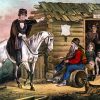 Arts, Culture, and Entertainment
Arts, Culture, and Entertainment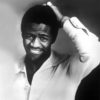 Music and Musicians
Music and Musicians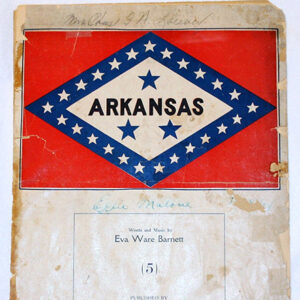 "Arkansas" by Eva Ware Barnett's
"Arkansas" by Eva Ware Barnett's 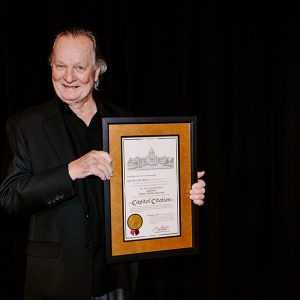 Wayland Holyfield Recognition
Wayland Holyfield Recognition 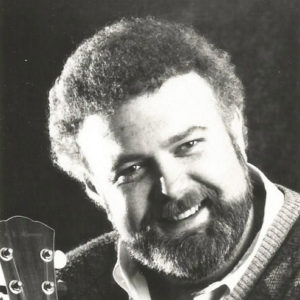 Terry Rose
Terry Rose 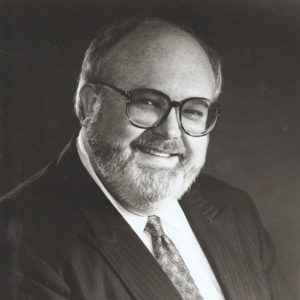 Terry Rose
Terry Rose 




Comments
No comments on this entry yet.